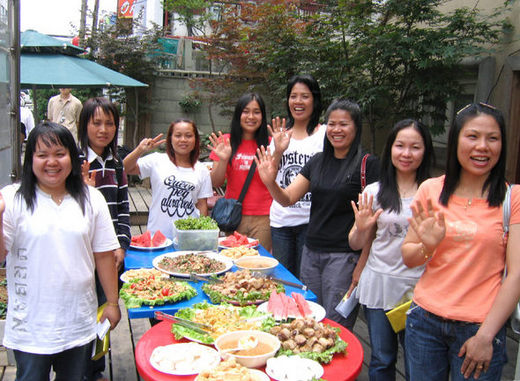Posted on : Jun.26,2006 11:16 KST
 |
|
Eight female workers from Thailand who who received medical treatment in a hospital in Ansan, Gyeonggi province were smiling at a farewell party held on June 23. They were temporarily paralyzed after suffering a chemical exposure while working in Korea. They recuperated fully after an 18 month-long treatment. They will soon be returning to their homeland.
|
Civic, religious groups and government stepped in to help
Eight female workers from Thailand who were temporarily paralyzed after chemical exposure will return to their country today, a year and five months after being hospitalized in Ansan, Gyeonggi province.
They arrived in Korea after paying 6 to 10 million won (6,000 to 10,000 USD) to local brokers, hoping they could earn more than what was possible in their native country.
Working at an LCD parts factory in Hwaseong, Gyeonggi province, one by one the women began to lose the use of their legs. The cause was found to be overexposure to Normal-Hexane, or n-hexane, commonly used in laboratories worldwide. The solvent can cause neurological damage upon extreme exposure. The women were exposed to the agent, unprotected, for up to 12 hours a day. The owner of the company tried to conceal the incident and hurriedly returned three of the Thai workers to their homeland.
Chuonchom, 31, who has a son and daughter in Thailand, recalled the initial incident. "I really felt bitter against Koreans, who were indifferent to our sickness."
The women's story was uncovered by the Hankyoreh January last year. Since then, five of the Thai laborers, including Chuonchom, were hospitalized with the help of civic and religious organizations, such as the Ansan Migrant Shelter. In addition, the three workers who were sent back to Thailand came back to Korea to receive medical treatment.
Sirinan, 38, whose lower body was temporarily paralyzed and was one of the three women sent back to Thailand by her boss, said, "My parents thought I was soon going to die." When one of the civic religious group leaders visited her house in Thailand and suggested she come back to Korea to receive treatment, "my parents replied, 'Even if you go back to Korea, you will die. However, go and receive medical treatment for the last time.' " Sirinan was able to recover after the medical treatment received in Korea.
Additional hope was found after the Korean government ruled the women's case as an industrial disaster. The Gyeonggi provincial government joined with the civic groups in supporting the women, provided them with living expenses and a place to stay.
"I really thank the Koreans who helped me walk again," one of the workers said.
The women received about 70 percent of their wages while they were hospitalized. They will take their earnings to their hometowns and begin again, they said. Chuonchom plans to open a traditional Thai bakery and Sirinan will run a convenience store. All eight women now have plans for the future.






